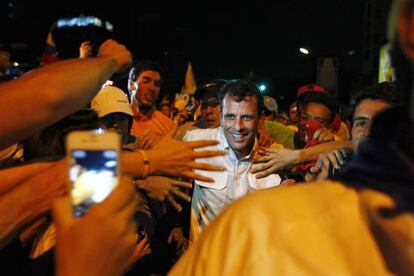Maduro, Capriles vie for security champion kudos
Country suffered over 16,000 homicides last year

The two main contenders in Venezuela’s presidential elections of April 14 this Monday gave indications of what the main theme of their campaign will be: the fight against citizen insecurity, which most surveys show to be Venezuelans’ top concern.
In a visit filled with symbolism, acting president Nicolás Maduro, who is the ruling party’s candidate to succeed the late Hugo Chávez, visited the new facilities of the Universidad Nacional Experimental de la Seguridad (UNES), a training center for national police located in what was once Retén de Catia, one of the most dangerous penitentiaries in the country, west of Caracas. Surrounded by government officials and representatives of social movements, Maduro underscored that his presidency will be “one of peace.”
In a debate that was aired on radio and television right after the visit, Maduro once again riled against “the feast of death” depicted by the media, which he claims is one of the direct causes of violence in the country. During his address, in which he used his by now trademark iPad as a lectern –Maduro has proven to be a real fanatic of the device – Chávez’s heir apparent announced the creation of a Central Security Command and called on the development of pilot pacification projects in the 79 municipalities which account for 86 percent of all crimes, according to official statistics.
Just minutes later, the opposition leader and governor of the state of Miranda, Henrique Capriles, gave a press conference in which he unveiled his own agenda for the first week of campaigning, which officially began Tuesday. His first event was a “peace march” organized for that same night in 19 states simultaneously, and whose stated goal was to achieve a dream made impossible by crime: “For Venezuelans to be able to walk down the street at night, for public areas to belong to the people.” Capriles himself participated in the march that started out of the eastern part of Greater Caracas, according to the daily El Universal. "This is the kind of country that we want to build, one where we can all tread without fear,” he said.
Insecurity is a scourge that strongly affects Venezuelans’ daily lives. According to the Interior Ministry’s Management Report, there were over 16,000 homicides in the country in 2012. Caracas, the capital, ranks third on the list of the world’s most violent cities, right after San Pedro Sula (Honduras) and Acapulco (Mexico), says a study released in February by a non-profit group.
Interior Minister General Néstor Reverol on Monday revealed that so far this year there have already been 3,400 murders in Venezuela. The release of this figure might seem almost like an involuntary act, because in 2004 the Chávez government – insisting that insecurity is merely a “feeling” spurred by the media- forbade police agencies from releasing crime figures. As a matter of fact, the minister was using the murder figure just to underscore the real message he meant to convey: that 545 of those homicides, nearly one out of six, took place in Miranda, where Capriles is governor.
The opposition leader ignored the criticism and again denounced the imbalanced news coverage of the state broadcaster, which he said has devoted 46 hours to the Chávez candidate’s election promises and barely one minute to himself. Nevertheless, on Monday the state television channel, Venezolana de Televisión, took the unusual step of covering a few minutes of the opposition candidate’s press conference – although it said its own reporters had been barred from the event.
In a decisive tone, Capriles admitted that in his earlier campaigning for the October 7, 2012 elections he had tolerated “many abuses,” and as though to make it clear that he will no longer be accepting such behavior, he began making accusations of his own.
He noted that the National Electoral Council will soon be receiving the complaint filed on Sunday by opposition deputy Alfonso Marquina, concerning a document allegedly leaked by the armed forces and suggesting that military officials are being tasked with transporting pro-Maduro voters to polling stations on April 14. Capriles thanked the military officials who made sure the document reached him, and announced that he already knows who his defense minister will be, should he win the elections: “He is a working general who is very well respected in the Armed Forces, not one of those who just talk.”
Capriles also criticized the state media for referring to Maduro not as the acting president but simply as the president. “We need to stress this, nobody has elected Maduro,” he said. “His presidency is a manipulated mandate; starting tomorrow he should only be participating in the campaign as a candidate.”
Tu suscripción se está usando en otro dispositivo
¿Quieres añadir otro usuario a tu suscripción?
Si continúas leyendo en este dispositivo, no se podrá leer en el otro.
FlechaTu suscripción se está usando en otro dispositivo y solo puedes acceder a EL PAÍS desde un dispositivo a la vez.
Si quieres compartir tu cuenta, cambia tu suscripción a la modalidad Premium, así podrás añadir otro usuario. Cada uno accederá con su propia cuenta de email, lo que os permitirá personalizar vuestra experiencia en EL PAÍS.
¿Tienes una suscripción de empresa? Accede aquí para contratar más cuentas.
En el caso de no saber quién está usando tu cuenta, te recomendamos cambiar tu contraseña aquí.
Si decides continuar compartiendo tu cuenta, este mensaje se mostrará en tu dispositivo y en el de la otra persona que está usando tu cuenta de forma indefinida, afectando a tu experiencia de lectura. Puedes consultar aquí los términos y condiciones de la suscripción digital.








































